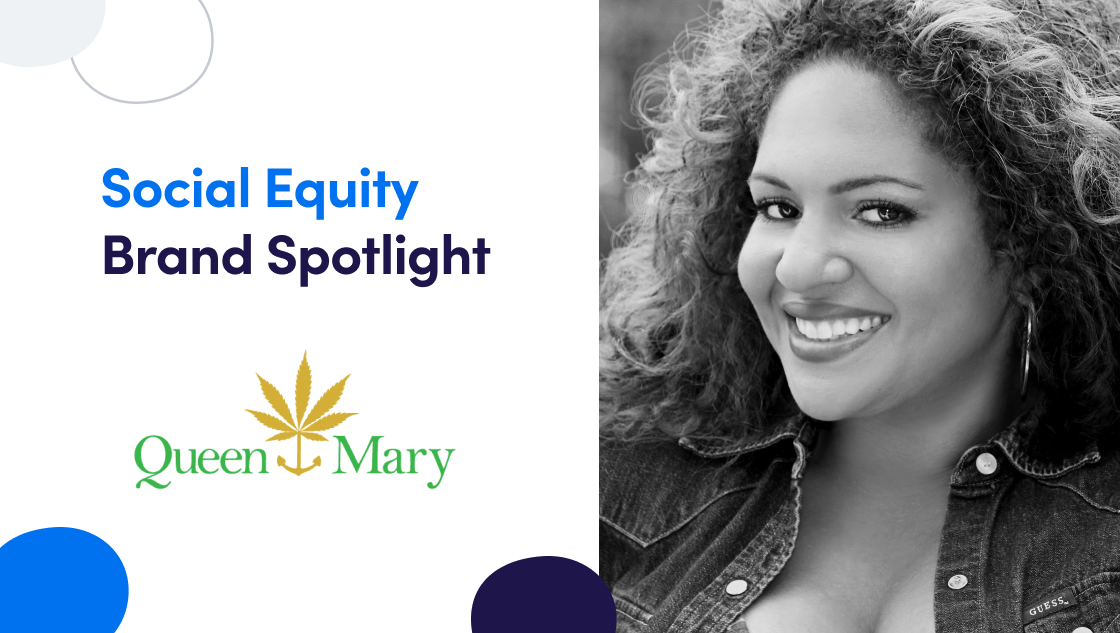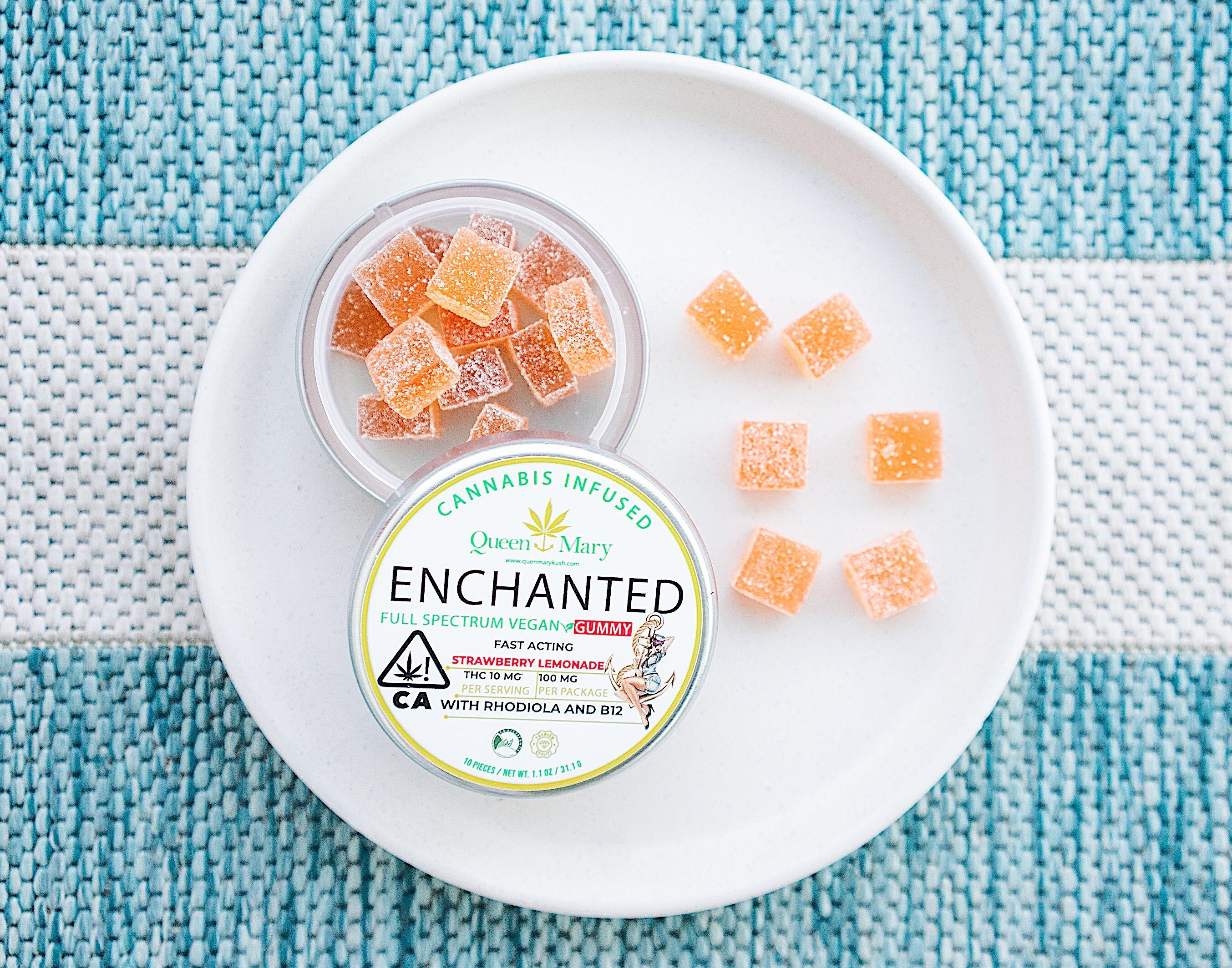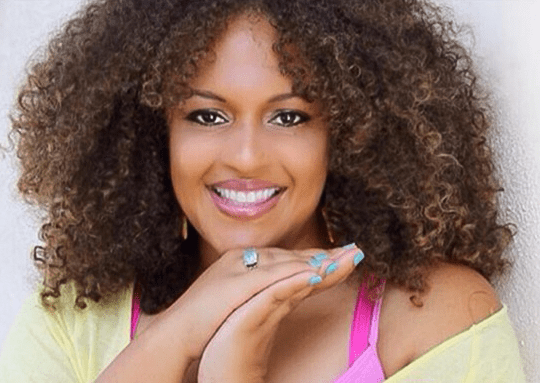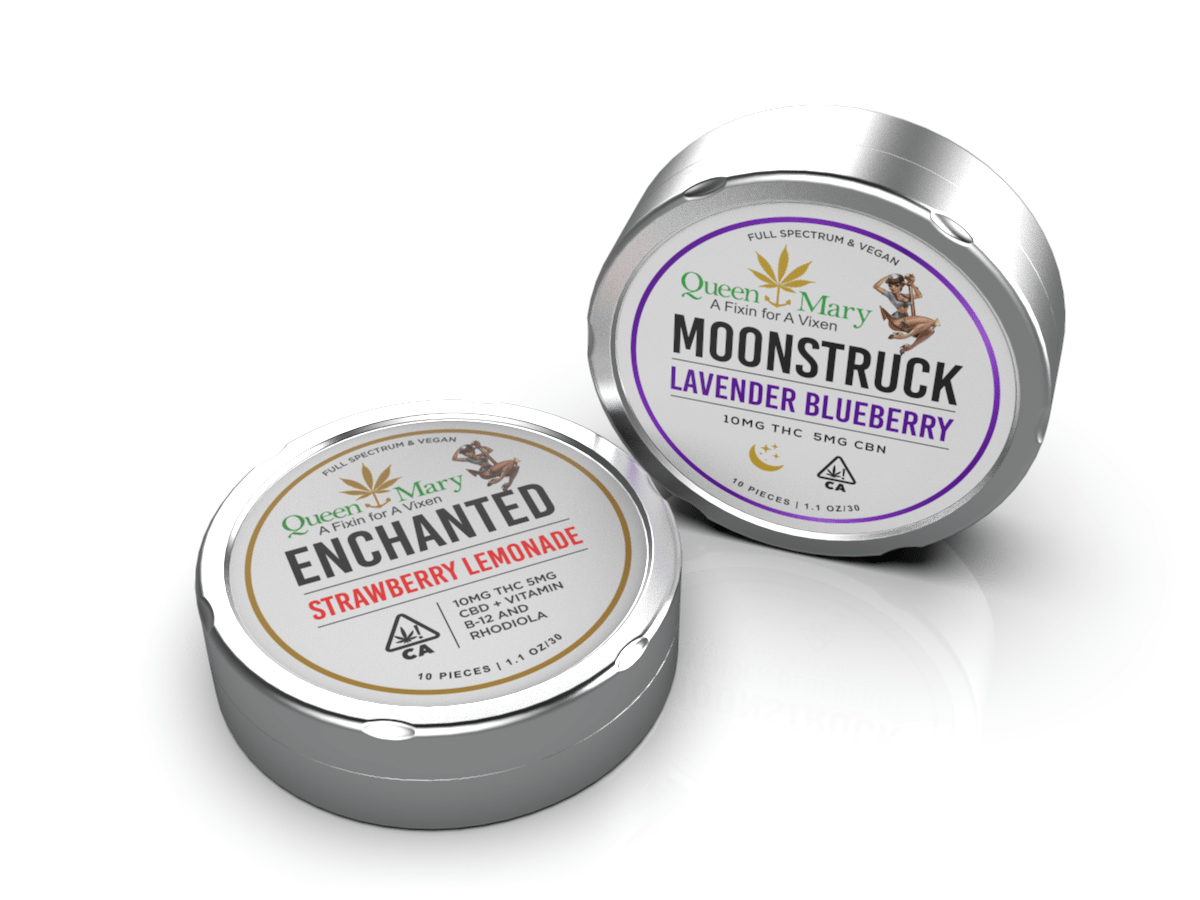
Social Equity Brand Spotlight: Queen Mary
We’re sharing the stories behind some of our favorite social equity brands. This week we spoke with Tiana Woodruff, founder and CEO of Queen Mary, a social equity cannabis brand providing customers alternative products to deal with the challenges and stress of everyday life.
Tiana Woodruff is the CEO and founder of Queen Mary, an exciting new cannabis brand out of California that is truly changing the game by incorporating natural supplements and healing techniques into high-quality cannabis products. Tiana sat down with us this month to discuss her background, why she started Queen Mary, and what’s next!
On her background and entering the industry
Cannabis has always been a part of my life. I was affected by the War on Drugs and had family members go to jail as a result. I also have a grandmother that I took care of that was deeply suffering from chronic hip pain – they used to give her Cortisone shots and when that stopped working they prescribed her opiates at like 87 years old. I watched the sweet amazing grandmother I knew become hooked on them which changed her entire personality. She became mean, demanding and distant, so I started her on cannabis which she was initially very against.
I asked her to try a gummy, because little grandmas have a sweet tooth right? Well it became something that really helped and we were able to wean her off of opioids (which she was taking 2-3 times a day). That’s when I started looking into it and learning about the healing that cannabis is capable of, especially after seeing it turn her life around. Fast forward a few years, and I entered the cannabis industry officially as a delivery driver for a few dispensaries, delivering cannabis door to door.
I was learning the industry and the laws were a bit different, but I saw that a lot of the people I delivered to were women. So I got this idea to start my own cannabis delivery service, by women for women right? I thought I could just go to the website and get a license, but it was more complicated than that.
The state pointed me to DCR out of Los Angeles, and I had to go through their system. This was right as the social equity program was being established, and I realized I could qualify. So I went through the whole social equity process in LA with the DCR on my own, without the help of an attorney or business plan or anything like that. I qualified and got my status, which was like, “yay!”
“Cannabis has always been a part of my life. I was affected by the War on Drugs and had family members go to jail as a result.”
This whole time, I bootstrapped the business myself. I took my stimulus money, my tax return, and I won a grant for $10,000 to get the business started.

On the process of getting a license
Once I got my status, it came time to apply for a license. The DCR opened a window for 100 licenses, and of course the kicker was that you had to have a location and lease before you could sign for a license. I’m running around trying to find a space to lease, and finally I found one in Valley Village – got the lease signed, applied for my license at the 11th hour, and then the DCR was audited and they found that there was more than 150 applicants for the 100 licenses in the first 20 minutes the window was open. This wasn’t public information at the time, and I had no idea that I didn’t stand a chance of getting a license.
Eventually I found myself hundreds of people down on a list, nowhere close to getting a retail license anytime soon (they didn’t have standalone delivery licenses at the time either.) They’re working harder to do what they can to help with the situation, and now I could apply for a delivery-only license. But in all that mess, I actually had gotten a business partner and had applied for a license on the westside of LA through a public PCN.
My business partner and I had secured a location in Westwood, but the District 11 city rep had to approve the applications. Unfortunately, he was recalled last year with three applications in his district that he was going to approve. He ended up letting them all expire and once you apply for a PCN application which is like $4,500, you have 90 days for the city council to approve it. If they don’t, you just lose it all. I lost my business partner, investor, and the location in Brentwood along with a $40k deposit on the deal. So once again I’m standing there with nothing, so what do I do?
On developing Queen Mary with Our Academy
I came across this wonderful group called Our Academy, part of Our Dream – it’s a nonprofit organization that educates and helps with social equity. I became one of their mentees and went through the program. They taught me every aspect of the business, from owning your own brand, the laws and regulations, accounting and Metrc and all of the crazy things you can’t even imagine that go into the business of cannabis. My mentor was the owner of a delivery service, SAVA in San Francisco, and helped me to design my brand which turned into Queen Mary.
I was able to apply for the trademark and Queen Mary came into fruition. So Queen Mary is a cannabis brand, catering to women for mental health and as an alternative to addictive prescriptions. I started figuring out how I would develop these cannabis products and take advantage of the healing powers that this amazing plant has.
“Queen Mary is a cannabis brand catering to women for mental health and as an alternative to addictive prescriptions.”
I have to give a lot of credit to Our Academy, because they filled in a lot of blanks for me. Getting through the social equity application process was one thing, but navigating putting a brand out there and being able to take it to market and get it on the shelves is another huge challenge.
We need retailers to put products on the shelf from social equity brands, and we need them to sell because that’s what will drive more orders. I wish they would buy more from social equity brands, but it doesn’t always work like that.

On positioning Queen Mary as a premium brand
Unfortunately, when a lot of people hear social equity they tend to think that you don’t have the supply chain, or the experience. They assume I don’t know how to best market my brand, they even question my pricing – but I consider Queen Mary to be a premium brand. We use premium ingredients. Our gummies are rosin which nobody is really doing because it’s expensive and time-consuming. But because of that I know exactly what strains are in my gummies.
My gummies are a more premium cost, but it’s for a reason. We don’t add any sugars or red dye #4. Our products are vegan, natural, and full-spectrum rosin. They are water-soluble and fast-acting. We are not just a cannabis brand; we’re promoting mental health and doing something different by adding natural supplements to our ingredients to aid in that process.
I find when I send people all of this information, they tell me my products are priced too high for a new brand. Most dispensaries mark up our products 2.5 times the wholesale price (150%). They are also comparing my products to a gelatin-based inexpensive isolate gummy that can be made for less than a dollar, while mine are full-spectrum and use nano emulsion, which costs far more to produce.
I’m okay with this as a business owner because I believe in my product and the message. The best way to sell my product is to share my story and get the message out, but that doesn’t always work because a lot of the buyers are too busy to listen. I am competing with larger established brands or the next hip hop celebrity who is putting out some new strain and it shouldn’t be a competition, especially for someone like me who is really doing something new and innovative in the cannabis space.
The price of my products is on the same level as the top edible brands, but I get pushback because I’m social equity and new, so some larger retailers don’t think I can compete. But this simply isn’t true. If they looked more at what the brand is about and our quality process, they would see that – but the truth is it’s a challenge just getting the buyers to respond, let alone listen to your company’s purpose. I understand that they get bombarded by tons of brands every day trying to get on their shelves, but that’s their job.
“…I’d like to see a requirement for dispensaries, by law, to carry 20% social equity brands because then when a social equity brand goes in, they’d have a better chance.”
My mother worked in sales for 35 years. There’s a very specific way to get into the office or store with your products but it’s not like that in cannabis at all. It can be a guys’ game, who and what you know, and it’s still an insider sport.
If you aren’t with one of the 4 major distributors in this state who charge upwards of 25%, which most social equity brands can’t afford because that’s almost our entire profit margin, there is a real barrier to entry. It would be great if there was some kind of path, especially for social equity brands, to get onto shelves more easily. Most of us come from legacy and we all have a story to share.
Honestly, I’d like to see a requirement for dispensaries, by law, to carry 20% social equity brands because then when a social equity brand goes in, they’d have a better chance. Some dispensaries are starting to make room for social equity brands on their shelves but there are over 800 dispensaries in California and only a fraction of stores are making the effort.
Want to add a Social Equity Seller Badge to your brand’s LeafLink profile? Click here to submit details around your social equity license or program.
On the impact of the federal laws regarding cannabis
Another thing I’ve learned is that THC by itself is not really the best way to use cannabis. What you need are the terpenes and everything else that comes in the full structure of the cannabis flower to create the real high that your body needs. Our bodies naturally have terpenes, even our food does – these are all things we’re learning.
But the main reason none of this information is out there is because cannabis is illegal on a federal level. Universities that do studies can’t research cannabis because it’s illegal. They risk losing their federal funding if they choose to research cannabis, so it’s basically just private companies funding private studies that may have their own agenda. The data can get skewed and we don’t know how reliable the research is.

We have to allow our research centers and universities to study the plant and get the real information out there so the consumer can understand exactly what cannabis is about and how it can help them. And it’s not just for cancer patients, there are many more benefits than that.
Some people say cannabis is the “miracle drug” and it might be, but it’s hard to say. We need more research and more time behind it to truly understand the benefits and possibilities. We need to let our people study it and discover more about the health and wellness benefits. Anxiety has become a disease, like a viral infection and people are taking all these pills and medications, but sometimes it isn’t helping enough.
“We have to allow our research centers and universities to study the plant and get the real information out there so the consumer can understand exactly what cannabis is about and how it can help them.”
We need to change that, to help people function and work through their days in a healthier way but it can be difficult without being able to truly study the plant in an in-depth way.
On the opioid crisis and her inspiration
There’s a crisis right now, and it’s the accidental overdoses and the opioid crisis which we all know about. That’s been a big part of my life, and the fact is that my mom’s only sister, my aunt and one of the closest people to me in my entire life, passed away a few years back from an opioid overdose. I also had a close friend when I first moved here who was my neighbor – she also died of an opioid overdose after she had cancer. She made it through her treatment and the cancer, but she died of an overdose.
“What if we added supplements to cannabis so we could tackle the vitamin deficiencies and negative effects of opioids, but also provide some of the high that prescription opioid users were chasing?”
It’s basically been all around me, people dying from their prescription medicine. I’m a child of the ‘80s, you know with MADD (Mothers Against Drunk Driving) and all that “Just Say No” stuff – that cannabis was a gateway drug and if you smoke it, next thing you’ll have a crack pipe in your hand.
Well as an adult, I started doing some research and there is a lot of information out there about taking natural supplements to offset the effects of prescription medicine. Dr. Amen, a brain disorder specialist, has a great book titled Change Your Brain Change Your Life. He has written many books and has clinics across the country, helping people combat mental illness and weaning them off of prescription medications with natural supplements.
I started planning around that and figuring out, what if we added these supplements to cannabis so we could tackle the vitamin deficiencies and negative effects of opioids, but also provide some of the high that prescription opioid users were chasing?
These supplements help give you more focus, improve your mood, combat anxiety and depression, and Queen Mary products also have the THC you need to keep that balance. We’re new in the market but we’re finding our niche and trying to help improve mental health while we’re at it.

On Queen Mary’s products
The two primary gummies I have right now are called Moonstruck and Enchanted. Enchanted is a day-time gummy and it has 10mg of THC. It’s also infused with Rhodiola and B12, which are natural supplements. B12 helps with energy and focus and Rhodiola is a mood enhancer and provides relief from anxiety and stress. Combined with the THC, the gummies provide a more focused and effective high for your day. Some people start with half mid-morning and the other half mid-afternoon to keep a consistent feeling of productive euphoria throughout the day.
Our second gummy is called Moonstruck, which also has 10mg of THC. These days our minds are going 100 miles per hour and we’re constantly distracted by devices and complications in our lives. Moonstruck also has 5mg of CBN, which is a natural sedative to help you relax and with sleep. There are very few products in the market right now with CBN, and when they do it’s usually one or two milligrams. We use 5 because it’s a night gummy and is supposed to help you sleep. CBN is also great for inflammation, so it helps with arthritis, Crohn’s disease, really any pain and inflammation. You take it at night and get a good night’s sleep, then wake up refreshed.
I used to wake up in the middle of the night due to shoulder pain and it would sometimes keep me awake for long periods of time, as I was too uncomfortable to return to sleep. I tried lots of over-the-counter meds but it really didn’t help – so my own journey into finding a solution is what inspired this product.
“Our products are vegan, no added sugars and everything is naturally flavored. Even the dust on the outside looks like sugar crystals, but it’s actually made of monk fruit.”
This is just the start, and we’re trying to expand in the next couple of months with some additional gummies including ones for physical health. I’m looking into some other supplements to help with this, like an immune gummy that will have Zinc and other things to help with COVID, flu season, etc. Another is going to be more like a multivitamin, which you can take daily with a lower amount of THC. I’m into health and wellness and bringing these products into the THC cannabis market has been very rewarding.
Our products are vegan, no added sugars and everything is naturally flavored. Even the dust on the outside looks like sugar crystals, but it’s actually made of monk fruit. We’re all about healthy, natural everything in our products. I also have an elixir coming up that’s called Boost, and it has Vitamin B12 and 20mg of THCV which is gaining popularity. The best way I could describe it is like a natural caffeine, and so we’re making an espresso flavor to match some of the bitter flavor that comes with using nano liquid THC vs. oil. You’re going to want to drink the whole bottle, it’s that good and it will give you that burst of energy you need in the afternoon. It’s a great product that I cannot wait to get on the shelves.

On the benefits Queen Mary has seen with LeafLink
What I love most about LeafLink has been all the help I get with my accounting and my tracking of products, the software and invoices. It’s really a great platform for me –– I initially got it only because my distributor uses it and they said, if you’re going to work with us you have to use LeafLink. I use it for inventory management and invoice support, monthly projections and all that. LeafLink helps me internally big time.
I also appreciate that places like LeafLink will give me a great discount on having your services every month. There are certain places that give social equity brands a leg up financially and this is very rewarding and important as social equity brands don’t have the capital or resources that the big brands do.
On what’s next for herself and Queen Mary
Since the beginning of COVID, I have become a foster mother to two kids that were taken from their mom due to prescription opioid and drug abuse. This was another inspiration for me and has driven me forward into providing a new type of product that will make a difference in an industry that is very saturated. So I’m finding my niche, infusing natural supplements and seeing how we can develop Queen Mary into a health and wellness brand. It’s been going very well, and it’s really near and dear to my heart – I have been enjoying the whole ride.
“It’s so much pressure, and lots of people deal with the pressure through prescriptions and that’s what we’re trying to help alleviate.”
This is something I want to get back to is having more foster kids in my home. I’ve been doing research and African-American women have their children taken away from them at 5 times the rate of white women. Providing a shelter as a way to give back again would be amazing, and that’s kind of the point of Queen Mary as well – a “fixen’ for a vixen” and we want to give women back our queendom and vivify our day. Part of this is keeping our families together, through the everyday stress of work and taking the kids to school, to practice, shopping and cooking and all that.
It’s so much pressure, and lots of people deal with the pressure through prescriptions and that’s what we’re trying to help alleviate. Being able to shift that into a more natural substance that is less addictive and still makes you functional throughout your day is so important to our daily life.
Get your Social Equity Seller Badge
Want to add a Social Equity Seller Badge to your brand’s LeafLink profile? Click here to submit details around your social equity License or program. Brands with Social Equity Seller Badges have the opportunity to be highlighted on the marketplace, as well as in marketing emails and on social media.